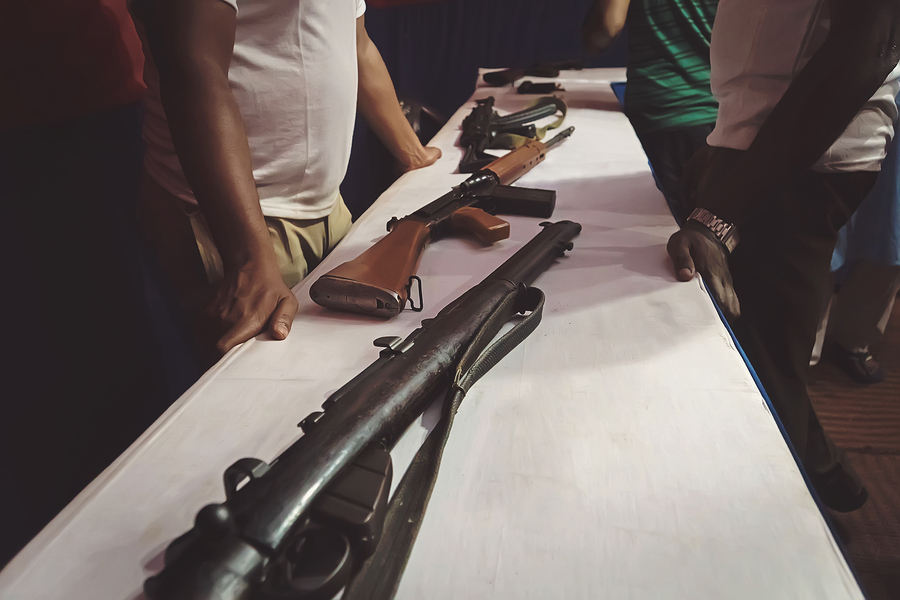
If you are being charged with a federal weapons offense in Texas, it is critical to understand your rights under the law. Federal weapons offenses are complicated and could result in severe penalties. The first and most important step is to hire a skilled and aggressive criminal defense attorney.
Common Federal Weapons Offenses
There are numerous crimes under the umbrella of federal firearms offenses. The two primary laws governing gun crimes are 18 U.S.C. § 922 and 18 U.S.C. § 924. The most common charges brought under these laws include:
- Illegal Possession of a Firearm
Despite the 2nd Amendment, federal law prohibits certain classes of individuals from owning firearms:
- Felons,
- Individuals convicted of a domestic violence misdemeanor or subject to a domestic violence restraining order,
- Drug addicts,
- The mentally ill,
- Illegal aliens or legal aliens on non-immigrant visas,
- Individuals dishonorably from the armed forces, and
- Individuals who have renounced their U.S. citizenship.
Illegal possession is a Class C felony punishable by up to ten years in prison with no mandatory minimum sentence.
- Use of a Firearm in Furtherance of a Crime of Violence or Drug Trafficking Felony
It is illegal to use a firearm in furtherance of a crime of violence or a drug trafficking felony. This offense is punished severely and comes with mandatory minimum sentences depending on the type of gun and how the gun was used during the crime. The mandatory minimum sentences are:
- Five years for mere possession of a gun during the crime,
- Seven years for brandishing a gun during the crime,
- Ten years if the gun was discharged during the crime,
- Ten years if the gun was a short-barreled rifle or shotgun, and
- Thirty years if the firearm was a machine gun or a destructive device.
If it is the individual’s second conviction for carrying a gun during a violent crime or drug-trafficking felony, the mandatory minimum is twenty-five years. The sentence increases to life in prison if the firearm used during the second conviction is a machine gun or destructive device.
Importantly, these sentences must run consecutively with the sentence for any related drug or violent crime. This means the sentences cannot be served at the same time.
- Illegal Sale of Firearms
It is illegal to import, produce, or conduct transactions of firearms across state lines unless you are a licensed firearms dealer. Furthermore, even if you are a licensed firearm dealer, you can be convicted of illegal sale of firearms if you sell firearms to certain individuals, including minors and anyone prohibited from owning a gun under federal or state law.
All individuals, including licensed dealers, are prohibited from selling certain types of weapons like bombs, grenades, rockets, missiles, explosives, and incendiary devices. A conviction can lead to a prison sentence of five to ten years.
- Straw Purchases and Fraud
If you are an individual prohibited from possessing a firearm, it is illegal for another person (“straw purchaser”) to buy a gun on your behalf. Additionally, it is illegal to make false statements or misrepresentations to a firearm dealer when purchasing a gun. Convictions for straw purchases and fraud can result in prison sentences up to ten years.
- Altered or removed serial number
Under federal law, gun owners must preserve the serial number on their firearms. If you knowingly deliver, transport, or possess a gun that has an altered or removed serial number, you could face up to five years in prison.
- Possession of a Stolen Firearm
It is illegal to knowingly transport or possess a stolen gun or stolen ammunition. The penalty for possession of a stolen firearm could be up to a ten-year prison sentence.
Defending Federal Weapons Offenses
There are several defense strategies that your attorney could present if you have been charged with a federal weapons offense. The defense will depend on your specific charges and the unique facts of your case. Below are some common defenses in federal weapons cases.
- Legal Justification
The law provides certain legal justifications, like duress and necessity, in federal weapons offenses cases. Your attorney can argue that you were justified in possessing the firearm because you were under an unlawful and imminent threat of death or bodily injury.
- Illegal Search and Seizure
The Fourth Amendment of the U.S. Constitution prohibits unreasonable search and seizure. If the police violated your rights, any evidence collected illegally must be suppressed. The exclusion of evidence, particularly if it is the firearm, can lead to lesser charges or even an acquittal.
- Lack of Intent
Most federal weapons offenses require that the defendant commit the crime knowingly. If you did not possess this knowledge, you cannot be convicted. For example, your attorney could argue that you did not know your statements given to a gun dealer were false or that the serial number on the firearm was removed.
Dallas-Fort Worth Criminal Defense Attorney
If you or a loved one are being investigated or have been accused of a federal weapons offense, you should immediately reach out to a local Dallas criminal defense attorney. A strong defense can make all the difference in your case. Philip D. Ray is an experienced criminal defense attorney and former prosecutor based in the Dallas-Fort Worth. Call The Law Offices of Philip D. Ray at (469) 588-6770 for a consultation.
